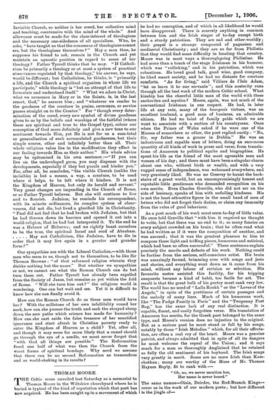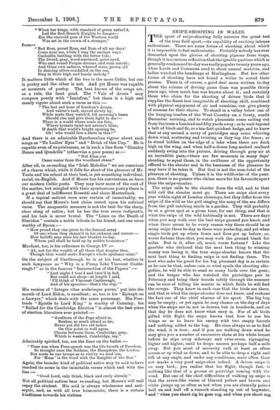THOMAS MOORE.
TTIE Celtic cross unveiled last Saturday as a memorial to Thomas Moore in the Wiltshire churchyard where he is buried is typical of the kind of reputation which that poet has now acquired. He has been caught up in a movement of which he had no conception, and of which in all likelihood he would have disapproved. There is scarcely anything in common between him and the Irish singer of to-day except birth and a sturdy patriotism. They are sad and other-worldly ; their gospel is a strange compound of paganism and mediaeval Christianity ; and they. are so far from Philistia that they would find some difficulty in locating that country. Moore was in most ways a thoroughgoing Philistine. He had more than a touch of the stage Irishman in his humour, which was "rollicking," and in his patriotism, which was robustious. He loved good talk, good wine, good company, he liked smart society, and he had no distaste for creature comforts. "As for living," said Villiers de Hale Adam, "let us leave it to our servants"; and this austerity runs through all the best work of the modern Celtic school. What kinship has the cheerful little man of the world with these anchorites and mystics ? Moore, again, was not much of the conventional Irishman in one respect. He had, in later life at any rate, many of the bourgeois virtues, was an excellent husband, a good man of 'business, an admirable citizen. He had no taint of family pride which we are wont to associate with a section of his countrymen. Once when the Prince of Wales asked if he were one of the Moores of somewhere or other, the poet replied curtly : "No, Sir, my father was a grocer in Dublin." He was an industrious and capable man of letters, doing an enormous quantity of all kinds of work in prose and verse, from transla- tions of Anacreon to political squibs and biographies. He spent his life as the friend of the most agreeable men and women of his day; and there must have been a singular charm about one who, without birth or wealth, and with a very rugged sense of independence, was welcomed everywhere, and very genuinely liked. He was no Creevey to haunt the back- stairs of a great world, but an uncompromisingly honest and reputable little gentleman who demanded recognition on his own merits. Even Charles Greville, who did not err on the aide of leniency, speaks of him with unfailing kindness. His is not the least attractive figure in the small band of men of letters who did not forget their duties, or claim any immunity from the rules of good behaviour.
As a poet much of his work must seem to-day of little value. He once told Greville that "with him it required no thought to write, but that there was no end to it; so many fancies on every subject crowded on his brain ; that he often read what he had written as if it were the composition of another, and was amused ; that it was the greatest pleasure to him to compose those light and trifling pieces, humorous and satirical, which had been so often successful." These sentences explain precisely the merits and defects of his work. Nothing could be further from the serious, self-conscious artist. His brain was amazingly fecund, brimming over with songs and jests and stories, and everything went down as it came from his mind, without any labour of revision or selection. His favourite metre assisted this facility, for his tripping anapaests became a kind of habit, too facile for art. The result is that the great bulk of his poetry must rank very low. The world has no need of " Lalla Rookh " or the "Loves of the Angels," in spite of the prettiness of certain passages and the melody of many lines. Much of his humorous work, like "The Fudge Family in Paris" and the "Twopenny Post Bag," has the same lack of any real distinction. It is capable, fluent, and easily forgotten verse. His translation of Anacreon has merits, for the Greek poet belonged to the same type, and Moore's version does no injustice to the original. But as a serious poet he must stand or fall by his songs, notably by those "Irish Melodies" which, for all their affecta- tion, are often a real cry of the heart. Moore was a genuine patriot, and always admitted that in spite of all its dangers he must welcome the repeal of the Union ; and it says much for a man so thoroughly Anglicised that he retained so fully the old sentiment of his boyhood. The Irish songs vary greatly in merit. Some are no more Irish than Kam- chatkau ; many are worthy of the Muse of Mr. Thomas Haynes Bayly, fit to rank with :— " Oh, no, we never mention her,
Her name is never heard."
The same names—Oisin, Deirdre, the Red-Branch Kings— occur as in the work of our modern poets ; but how different lathe jingle of- " When her kings, with standard of green unfurrd, Led the Red-Branch Knights to danger— Ere the emerald gem of the Western world Was set in the crown of a stranger,"
from- " Red Rose, proud Rose, sad Rose of all my days ! Come near me, whil9 I sing the ancient ways: Cuchullin battling with the bitter tide ;• The Druid, gray, wood-nurtured, quiet-eyed, Who cast round Fergus dreams, and ruin untold ; And thine own sadness, whereof stars, grown old In dancing silver-sandalled on the sea,
Sing in their high and lonely melody."
It matters little which of the two is the more Celtic, but one is poetry and the other is not. And yet Moore was capable at moments of poetry. The best known of the songs are, as a rule, the least good. The "Vale of Avoca" may compare poorly with "Innisfree," but them is a high and
manly vigour about such a verse as this :— "The last sad hour of freedom's dream, And valour's task, moved slowly by, While mute they watch'd, till morning's beam Should rise and give them light to die !— There is a world where souls are free.
Where tyrants taint not nature's bliss;
If death that world's bright opening be, Oh! who would live a slave in this ?"
And there is an admirable Bacchanalian vigour about such songs as "To Ladies' Eyes" and "Drink of this Cup." He is capable even of exquisiteness, as in such a line from "Country
Dance and Quadrille" (otherwise a poor poem) as
"Not Dian e'er
Came rosier from the woodland chase."
After all, in re-reading the "Irish Melodies" we are conscious of a charm which, while it falls far short of the glamour of Mr. Yeats and his school at their best, is yet something individual, racial, un-English. And if Moore has his conventions, so have our modern Celtic poets. They may have more of the root of the matter, but mingled with their spontaneous poetry there is a great deal of indifferent Rossetti and sham Maeterlinck.
If a topical satirist were ever certain of immortality, we should say that Moore's best claim rested upon his satirical verse. The anapaestic measure is not the best for the sharp, clear sting of satire; but be has the true saeva indignatio, and his lash is never brutal. The "Lines on the Death of Sheridan" contain a noble tribute to his friend, and one verse worthy of Byron :—
"How proud they can press to the funeral array
Of one whom they shunn'd in his sickness and sorrow :— How bailiffs may seize his last blanket to-day, Whose pall shall be held up by nobles to-morrow."
Mordant, too, is his reference to George IV :— " Ah, not for the wealth of all those that despise thee, Though that would make Europe's whole opulence mine."
On the subject of Castlereagh he is at his best, whether in such lampoons as "Why is a Pump -Like Viscount Castle- reagh?" or in the famous "Insurrection of the Papers "
" Last night I toss'd and turn'd in bed. But could not sleep—at length I said, I'll think of Viscount Castlereagh, And of his speeches—that's the way."
His version of "Integer vitae scelerisque puma," put into the mouth of Lord Eldon, is excellent; so, too, is his "Epitaph on a Lawyer," which deals with the same personage. His Free- trade "Epistle to Lord King" is worthy of Canning ; his "Ballad for the Cambridge Election" is almost the best piece of election literature ever printed :— " Goulbom of the Pope afraid is, Bankes, as much afraid as he; Never yet did two old ladies On this point so well agree.
Choose between them, Cambridge, pray, Which is weakest, Cambridge, say."
Admirably spirited, too, are the lines on the ballot :— " Time was when Free-speech was the life-breath of Freedom, So thought once the Seldens, the Hampdens, the Lockes, But mute be our troops as to vict'ry we lead 'em, For 'Mum' is the word with the Knights of the Box."
Again, the broader kind of political satire may be said to have reached its acme in the inimitable verses which end with the line " Good Lord, only think, black and curly already."
N ot all political satires bear re-reading, but Moore's will well repay the student. His acid is always wholesome and anti- septic, and, as with all true humourists, there is a certain kindliness towards his victims.































































 Previous page
Previous page